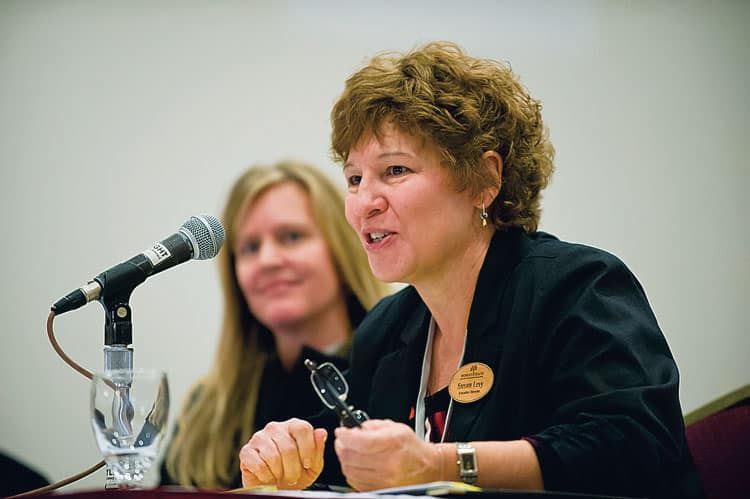No guarantee Affordable Care Act is the answer

LONGMONT – The Affordable Care Act does not fix everything.
That was the one message on Tuesday from Susan Levy, executive director of the Boulder Valley Women’s Health Center, as she spoke as part of a panel on the impact of the ACA on insurers, providers and people.
The expansion of Medicaid, Levy said, is important. But there will still be reasons some Americans don’t have insurance. People in the country illegally won’t be eligible for subsidies on the health-care marketplace.
SPONSORED CONTENT
Business Cares: April 2024
In Colorado, 1 in 3 women, 1 in 3 men and 1 in 2 transgender individuals will experience an attempted or completed sexual assault in their lifetime. During April, we recognize Sexual Assault Awareness Month with the hopes of increasing conversations about this very important issue.
While it’s generally considered a positive that parents can keep their dependent children on their insurance plans until age 26, that can cause some problematic privacy issues. There will also be low-income people caught in a situation where their turbulent job status might leave them bouncing back and forth between Medicaid and private health insurance.
“What do we do with those people who are in the gap?” Levy asked. “Those are important issues we need to keep in mind as we go forward and think about what our whole health-care marketplace needs to be like.”
Levy was joined on the panel by Julia Hutchins, chief executive of Colorado HealthOp, and Sharon Caulfield, an attorney for Caplan and Earnest LLC, at Pulse: What’s Next for Health-Care Reform? presented by the Boulder County Business Report at the Plaza Convention Center in Longmont.
PPerhaps the biggest refrain from the trio is that there needs to be patience in seeing how the Affordable Care Act shakes out. The underpinnings of the ACA, Caulfield said, are a triple aim that includes better care for individuals, better care for populations and lower per capita cost.
Caulfield said that while economic impacts of the ACA and how costs affect consumers should become apparent relatively quickly. She estimated, however, that it could be eight to 10 years before there is reliable data about health outcomes.
“There is going to be a need for patience and persistence in moving forward,” Caulfield said.
There are multiple insurance reform aspects of the ACA that will affect consumers, providers and insurance companies alike and are already taking shape, Caulfield said. Those include insurance companies not being able to deny coverage due to pre-existing conditions, adult dependent coverage to age 26, an insurance plan appeals process, and a minimum level of benefits. That final aspect is the reason many people have learned recently that they’ll be dropped from their plans, because the plans they were on didn’t meet the minimum standards.
The aspect of nearly everyone having access to preventive services, Levy said, will also be critical to the overall success of the ACA. That’s because people who don’t have insurance typically wait longer to seek care, thus leading to more costly care when the do seek it, not to mention worse health outcomes. Levy said that providing everyone with health-care access cuts overall costs in the long run.
All of the panelists said the act will place more responsibility with consumers to be active in their health-care decisions, and that includes their own lifestyles and taking charge of their own preventive care. That means more lectures from doctors about things like smoking and exercise habits.
“It is going to encourage all of us to be better consumers by being lower utilizers,” Levy said.
LONGMONT – The Affordable Care Act does not fix everything.
That was the one message on Tuesday from Susan Levy, executive director of the Boulder Valley Women’s Health Center, as she spoke as part of a panel on the impact of the ACA on insurers, providers and people.
The expansion of Medicaid, Levy said, is important. But there will still be reasons some Americans don’t have insurance. People in the country illegally won’t be eligible for subsidies on the health-care marketplace.
While it’s generally considered a positive that parents can keep their dependent children on their insurance plans until age 26, that can…
THIS ARTICLE IS FOR SUBSCRIBERS ONLY
Continue reading for less than $3 per week!
Get a month of award-winning local business news, trends and insights
Access award-winning content today!

